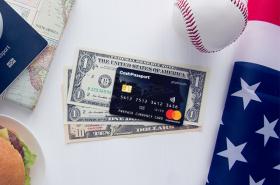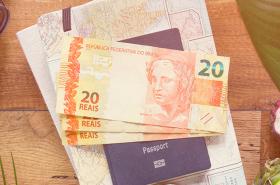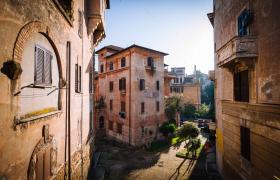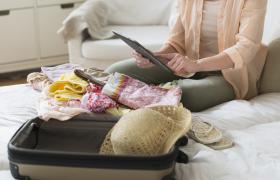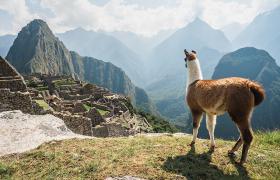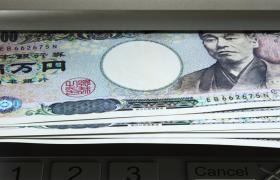We have it on good word that it isn't a pot of gold at the end of the rainbow. Instead, it is Ireland. Why? Well, firstly, it rains quite a lot there, and where there is rain there is a rainbow. Second, they have plenty of golden ale flowing all the time. Not to mention the leprechauns. Long story short, Ireland is a stunningly lush country bursting with friendly locals that must be on everyone's travel bucket list.
When planning a trip to Ireland, three things can leave you scratching your head.
- Your travel budget
- The difference between the Republic of Ireland and Northern Ireland
- The thick accent of an old Irish bloke after one too many pints in the local pub
Luckily for you, we can help with points 1 and 2. You're on your own with number 3, but chances are he can't understand your Kiwi accent just as much as you can't understand his Irish one.
In regards to your travel budget, the talented team at Travel Money NZ have whipped up a nifty budget calculator that combines Numbeo data and the latest exchange rate to give you the most up to date idea of how much you'll be spending. Before we dive into that though, let's have a quick powwow about the whole Republic of Ireland/ Northern Ireland thing.
There are 32 counties in Ireland, 26 are part of the Republic and six in Northern Ireland. The Republic of Ireland is an independent sovereign state and includes places like Dublin, Galway, Cork and Limerick. Northern Ireland is part of the United Kingdom and is home to sites like Derry and Belfast. As a traveller, here are the main things you need to remember:
|
|
Republic of Ireland |
Northern Ireland |
|
Currency |
Euro (EUR) |
Great British Pound (GBP) |
|
Language |
English and Gaeilge (Irish). Street signs may be in Irish, but English is widely spoken. |
English, Ullans and Gaeilge. English is the most common. |
|
Metrics |
Kilometers. |
Miles |
Many travellers question how strict each country is with their currencies, asking if euros can be used in the North and pounds in the Republic. For the most part, each country is pretty strict. However, within an hour of the border in both directions, it's not uncommon to find shops and vendors that will accept both. In the North look for places that say 'euro accepted' and vice versa in the Republic.
Better yet, we recommend loading your Cash Passport with both pounds and euros. Your card will automatically detect the local currency and save you the hassle of figuring it out yourself. Easy!
While both parts have their differences, they do share a fierce love for a pint, have breathtaking scenery, take St Patrick's Day very seriously and have equally ineligible accents after a long night at the pub.
Capiche? Alright, let's move on to your Irish travel budget.
What goes into a travel budget for Ireland?
Transport
The bad news is that Ireland is on the other side of the world, so your trek over will be at least a 24-hour journey. The good news is that New Zealand to Ireland flights are becoming increasingly more affordable. Plan to spend between $1000 (absolute bargain) and $2200 (ouch) on your flights to Ireland.
Once you arrive, there are a few different transport options. Ireland itself isn't huge, so you shouldn't be spending any more than five hours getting in between destinations. When it comes to inter-city travel, you have a few options:
Domestic flights: if you're in a rush with cash to splash, opt for a flight. The least scenic but most direct way of getting between major cities.
Car rental: if you've got time on your hands and are keen to explore at your own pace, car rental is the way to go. Expect to pay around 50NZD per day. It's well worth it in our opinion though, as driving through the rolling green hills to the latest small-town pub is part of what makes Ireland so unique.
Trains: In the Republic, you can book your rail tickets online. In the North, you are required to purchase at the stations. Either way, the trains are efficient and well priced, with the longest route setting you back between 80 and 120 NZD.
Bus: the longest bus route should cost you less than 30NZD, making bus or coach travel the cheapest way of getting across Ireland. The buses are clean, generally have wifi and are almost guaranteed to have a very friendly driver. What more could you want?
When in bigger cities and towns, you'll have a few different transport options to get from A to B. First and foremost is public transport, mainly buses and trains, though tram and electric rail networks are available. Irish public transport is fantastic, with most buses and trains offering free wifi and (once again) the friendliest drivers you ever did meet. For a single trip, you can expect to pay anywhere between 2.50 and 4.50 NZD depending on the city. We recommend getting a LEAP card that can be topped up and tapped on for public transport. Not only does it stop you carrying loose change, but the card can save you up to 31% on your tickets.
Rideshare and taxis are also options in bigger cities and smaller towns. With this in mind, some small towns are indeed very small, so your own two feet should suffice in getting you around.
Accommodation
In bigger cities like Dublin, Belfast and Galway you'll have plenty of accommodation options including hotels, bed and breakfasts, hostels and apartments. However, as you head further into the countryside your options may dwindle to smaller bed and breakfasts, motels and Airbnbs. What they lack in options, they make up for in warm hospitality though. If you're travelling in Summer, camping is also an excellent option – you may just need to account for equipment hire or purchase if you aren't bringing it over with you.
When in Ireland, expect to pay the following:
- Hostels, between 20 and 30 NZD per night
- Bed and breakfasts, between 30 and 80 NZD per night
- Budget hotels, between 60 and 80 NZD per night
- Apartments with kitchens, 80 NZD+ per night
- Fancy hotels, 100 NZD+ per night
As with most destinations, accommodation costs will be more in bigger cities and tourist hot spots, especially Dublin.
Food
While you may find varied culinary delights in bigger cities, as you head further out you'll realise that the Irish are known for a few particular dishes, mainly hearty stews and warm pub feeds. What more could you want after a potentially rainy day exploring the countryside? When visiting Ireland, be sure to try the following:
- Irish breakfast of fried eggs, sausage and beans. 10-15 NZD, sometimes included free with accommodation.
- Irish stew at the pub. What's in the stew will vary with where you are. Either way, expect to pay between 15 – 20 NZD.
- Fish and chips. 10 – 15 NZD
- Shepherd's pie. 8 – 20 NZD
As you visit pubs, you'll find most offer classic meals like roast, burgers and pies as well. Either way, you'll find something to pair with a local ale at the pub.
Speaking of local ale, expect to pay between 8 and 10 NZD for a pint outside of Dublin. In Dublin, you may need to budget a little more (or drink a little less), as drinks can be a fair bit more expensive, especially if the NZD isn't doing great against the euro.
Activities
Ireland is known for its lush, rolling green hills and unique landscapes. Luckily for you, nature is free to see. Some particularly famous places will charge a small entrance fee; however, it will not leave too much of a dent in your travel budget. Be sure to experience the following while travelling through Ireland:
- Stare in awe at the Cliffs of Moher
- Visit the Giants Causeway
- Wander through small towns, taking in their charm and visiting their pubs
- Get amongst the festivities during St Patrick's Day
- Go whale watching in Cork
- Explore the Blarney Castle near Cork and kiss the stone.
- Visit one of the many, many castles
- Go hiking, especially in the Wicklow mountains or along the North Coast
- Pay a visit to the museums, notably the Ulster Museum
- Head to Killarney and enjoy some medieval charm
If you have a car, you can easily access many of these locations yourself. Otherwise, you may have to fork out a little more to join day tours out to the attractions.
Pre-travel expenses
Kiwi’s don't need a visa for the Republic or Northern Ireland. We do recommend chatting with your doctor if you have any health concerns and, of course, investing in comprehensive travel insurance that will cover you for your entire trip.



